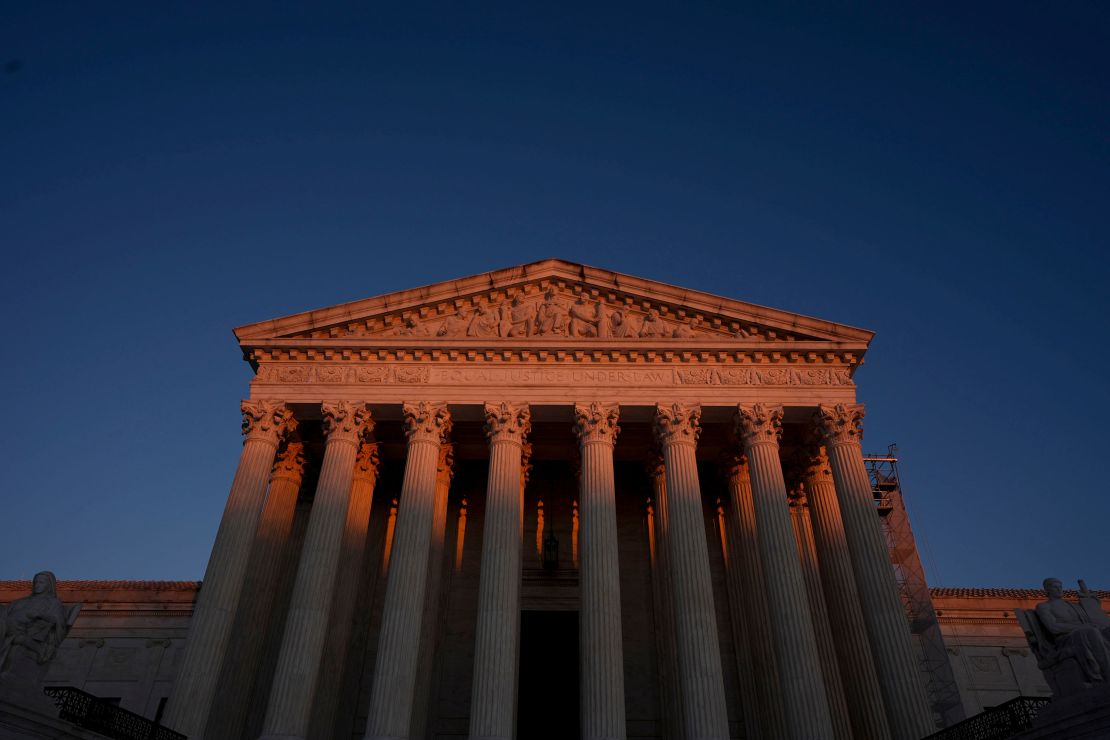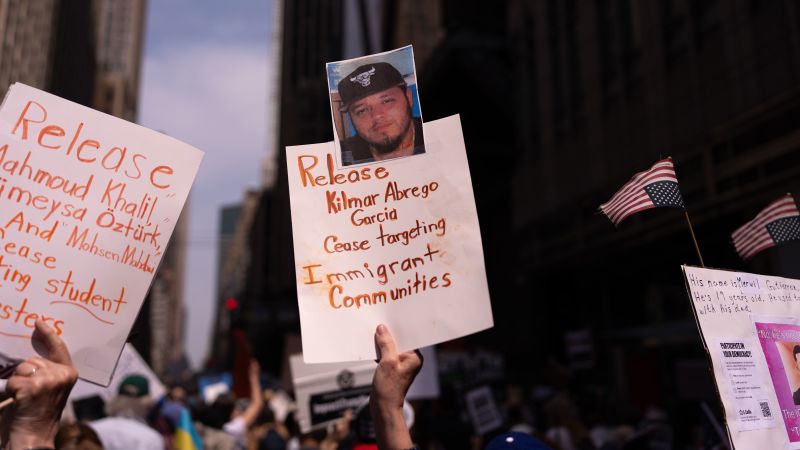CNN
—
The saga of Kilmar Abrego Garcia has become about more than one undocumented migrant’s plight in a Salvadoran jail and is now one of those rare cases that resonate in history and dictate the character of America itself.
The deported Maryland resident’s fate is turning into a defining test of Donald Trump’s mass expulsion program and of Democrats’ ability to frame an opposing argument on the politically tricky issue of immigration, which normally favors the president and his party.
The Abrego Garcia case and related matters could be the catalyst of a constitutional collision between an administration that brooks no restraints on its power and the authority of the judiciary to check an unfettered president.
The ultimate outcome of this critical legal battle could hinge on whether the conservative Supreme Court majority is willing to risk a showdown with the president, which it has seemed keen to avoid.
The administration admitted in court that Abrego Garcia was deported because of an administrative error, ignoring a judge’s ruling that he couldn’t be sent back to his native El Salvador, where his life could be in danger. But officials are refusing to return Abrego Garcia to the US, arguing they lack power to force El Salvador to do so.
Officials are also choosing to interpret the Supreme Court’s ruling that the Trump administration must “facilitate” his return as a unanimous endorsement of the administration’s position. They argue that because Abrego Garcia is in the custody of a foreign government, they have no power to return him.
The White House insists Abrego Garcia is a terrorist; a member of the notorious MS-13 gang, who will never be brought back to the US. But it has failed to produce definitive evidence to prove these claims. It has instead been maligning Abrego Garcia’s character by highlighting a domestic dispute with his US-born wife and a claim he was involved in human trafficking. But Abrego Garcia was not prosecuted in either case, and his wife has dismissed the allegations against him.

Maryland Sen. Chris Van Hollen visited El Salvador last week. Abrego Garcia was brought out of custody to meet him, wearing civilian clothes, in a photo op apparently staged by the Trump-allied government to embarrass the visiting Democrat.
“The subject at hand is that he and his administration are defying a court order to give Abrego Garcia his due process rights,” Van Hollen told CNN’s Dana Bash on “State of the Union” on Sunday. “They need to put up or shut up in the courts.” The senator argued the case proved America has a “lawless president who is ignoring the order of the Supreme Court of the United States to facilitate his return.”
Democrats, hurt by former President Joe Biden’s long refusal to admit a crisis at the southern border, have recently struggled to handle immigration politics. And the Trump administration has sought to exploit the Abrego Garcia matter to force his defenders to line up against its hardline stance, which it believes is politically beneficial.
But Van Hollen said the issues go far beyond one individual’s plight and get to the fundamental question of presidential power, where Trump is pushing and potentially exceeding the legal limits on issues beyond immigration. Van Hollen argued the president is using the scourge of gang violence to justify bypassing legal safeguards. Asked by Bash whether he would be OK if Abrego Garcia was eventually deported, given his undocumented status, Van Hollen replied: “I’m OK with whatever the law dictates.”
Van Hollen has been heatedly attacked by Trump and the White House over his visit. The president called him a “fool,” and the case has prompted some Democrats, including California Gov. Gavin Newsom, to suggest the party would be better off hammering Trump on the economy, an issue that may matter more to voters. But Van Hollen defended his stance. He told CNN’s Bash, “I don’t think it’s ever wrong to fight for the constitutional rights of one person, because if we give up on one person’s rights, we threaten everybody’s rights.”
The Trump administration’s border czar, Tom Homan, however, refused to give any ground on the case — which has become an acid test of the administration’s broader immigration approach. After all, if Abrego Garcia is returned, questions will be raised about the status of hundreds of other undocumented migrants the administration claims are terrorists and gang members who were shipped to a notorious prison in El Salvador. And the Trump administration would be tacitly admitting the courts had jurisdiction over its conduct.
“We removed a public safety threat, a national security threat, a violent gang member from the United States,” Homan said Sunday on ABC News’ “This Week.”
“ICE intelligence says he’s an MS-13 gang member. Confidential information says he’s an MS-13 gang member. The country of El Salvador says he’s an MS-13 gang member. I think he’s exactly where he should be.”

The Trump administration’s mass deportation program — a centerpiece of the president’s 2024 election campaign — is now embroiled in multiple legal challenges.
It seems inevitable that the policies, which have already landed before the Supreme Court, will return there for final adjudication in a moment of historic importance.
In the early hours of Saturday, for instance, a majority on the high court temporarily blocked the administration from deporting a group of immigrants in Texas under the 1798 Alien Enemies Act. Justice Samuel Alito, who dissented along with his fellow conservative Clarence Thomas, slammed the decision as “unprecedented and legally questionable.” The court is expected to issue a more formal ruling on whether the White House can go ahead in the coming days.
The use of the Alien Enemies Act is controversial for several reasons. First, it’s one of the most notorious laws in US history and was the basis for the internment of Japanese Americans in World War II, which is now regarded as a dark chapter in US history. Second, the act is designed to be used in time of war to detain and deport civilians. Despite Trump’s claim that the US is subject to a migrant invasion, the US is not in a state of war.
In another case related to the act, US District Judge James Boasberg ruled Wednesday that the administration showed “willful disregard” for his mid-March order halting deportation flights amid a dispute over the legality of the removals. He was the first judge to find “probable cause exists” to hold administration officials in criminal contempt.
The key concerns about the use of the Alien Enemies Act come down to the lack of opportunities for detainees to challenge the action against them in court. This impression — that basic constitutional rights and legal procedures that underpin the republic are being infringed — is crystalized by the Abrego Garcia case and is why Trump opponents like Van Hollen regard it as so critical.
In a key twist in the drama last week, a federal appeals court knocked back the administration’s request to overrule a Maryland federal judge, Paula Xinis, in the Abrego Garcia case. Xinis is growing increasingly frustrated with the administration’s delaying tactics and defiance after she ordered it to follow the instructions of the Supreme Court and “facilitate” his return.
In a ruling Thursday, the US Court of Appeals for the 4th Circuit denied the government’s emergency motion to stay Xinis’ order pending appeal. Writing for the appeals court, Judge Harvie Wilkinson said the administration’s assertion of “a right to stash away residents of this country in foreign prisons without the semblance of due process” should be “shocking not only to judges, but to the intuitive sense of liberty that Americans far removed from courthouses still hold dear.”
Wilkinson, an appointee of former President Ronald Reagan, warned of a situation in which two branches of government were “grinding irrevocably against one another in a conflict that promises to diminish both.”
“If today the Executive claims the right to deport without due process and in disregard of court orders, what assurance will there be tomorrow that it will not deport American citizens and then disclaim responsibility to bring them home?” Wilkinson asked. “And what assurance shall there be that the Executive will not train its broad discretionary powers upon its political enemies?”
The ruling encapsulated this perilous moment in American history, and the question of whether the judiciary — one of the last effective checks on Trump’s power — will constrain or enable a president who sees few limits on his authority.

